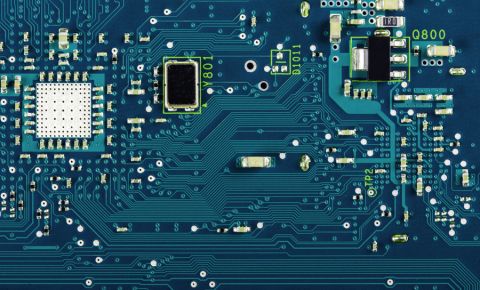A Retro-Computing Christmas
Sinclair 48K ZX Spectrum computer (1982) (Image source: Bill Bertram/Wikipedia)
It's starting to look a lot like (a retro-computing) Christmas. I understand why many younger readers cannot imagine a world before today's incredibly powerful computing and gaming systems with their high-resolution graphics subsystems. We all enjoy these systems, but those of us who are more... let's say "seasoned"… remember the raw excitement we felt just to own any computer back in the late 1970s and early 1980s.
Although those systems of yesteryear may seem simplistic now, we regarded them as being amazing back in the day. The reason for my waffling here is that two of these legendary systems -- the ZX Spectrum and the Commodore 64 -- are poised to be re-released as clones using modern technologies.
The ZX Spectrum Next
Created by Sinclair Research as the successor to the ZX81, the original ZX Spectrum was an 8-bit personal home computer that hit the streets in 1982. The "Spectrum" part of the moniker was intended to reflect the fact that it could display in color, while its ZX81 predecessor could display only in black and white. Having said this, each application could employ a palette of only 15 shades: seven colors at two levels of brightness each, plus black.
The original ZX Spectrum was based on a Zilog Z80 microprocessor running at 3.5 MHz. In turn, the Z80 was a software-compatible extension and enhancement of the Intel 8080 microprocessor. Over the years, the Spectrum was released as eight different models, ranging from the entry level with 16 KB RAM released in 1982 to the ZX Spectrum +3 with 128 KB RAM and built in floppy disk drive in 1987. Together, they sold over 5 million units worldwide (not counting clones).
The reason I mention this here is that I was just introduced to the ZX Spectrum Next, which started life as a Kickstarter Project, only to evolve into a movement.
To be honest, I'm a bit confused here, because I see multiple references to the ZX Spectrum Next boasting a Z80 processor, but I also see a note in the Kickstarter saying: "The Spectrum Next is fully implemented with FPGA technology, ensuring it can be upgraded and enhanced while remaining truly compatible with the original hardware by using special memory chips and clever design." This would make more sense to me -- implementing the Z80 as a soft core on an FPGA -- I'll have to contact its creators via the ZX Spectrum Next website to ask them for more details.
I know that my chum Alvin in the UK was a big fan of the ZX Spectrum (Alvin was my co-author on Bebop to the Boolean Boogie and How Computers Do Math). I just emailed him with the link to the ZX Spectrum Next saying, "Have you seen this?" Alvin immediately replied, "I still have my original one," and sent the following picture to prove it.
ZX Spectrum+ (Image source: Alvin Brown)
Alvin noted that he learned to program from scratch in BASIC on this machine, and he also wrote a little bit of assembler. He went on to say, "I had an expansion board and a Microdrive, which was magic at that time as you didn’t have to use audio tapes to store programs. The expansion board enabled you to wiggle the memory mapped GPIO pins using PEEK and POKE commands to read things like switches and control things like LEDs. One thing that was novel (and a pain in the nether regions) was the multifunction-per-key keyboard. I think they had up to 4 or 5 functions on a single key."
I fear the ZX Spectrum Next has fallen behind on its original delivery date. I just saw an update saying they hoped it would be ready by Christmas, and some wag commented back asking, "Which Christmas?"
I must admit I might be tempted to invest in one of these little rascals if it wasn't for something called THEC64.
THEC64
A few months before the ZX Spectrum was released in the UK, the Commodore 64 (also known as the C64 or the CBM 64) was introduced in the USA by Commodore International. The original machine sold for $595 US dollars, which would be equivalent to about $1,600 in today's money. According to the Wikipedia, "[The Commodore 64] has been listed in the Guinness World Records as the highest-selling single computer model of all time, with independent estimates placing the number sold between 10 and 17 million units."
The Commodore was based on the legendary 8-bit 6502 microprocessor from MOS Technology. I have a soft spot for the 6502 because I did a lot of my early assembly programming on this little scamp. One of my chums recently created a 6502-based computer on breadboards, then he capped himself by using it to drive a homemade virtual reality (VR) headset, but that's a story for another day.
The reason I'm so excited is that, sometime ago, a company called Retro Games launched an Indiegogo Project for something they call THEC64.
THEC64 (Image source: Retro Games)
As I wrote in my column, Speaking in [Archaic] Tongues (BASIC), "This bodacious beauty features three switchable modes: C64, VIC 20, and Games Carousel. This little rascal, which can connect to any modern TV via HDMI for crisp 720p HD visuals, comes equipped with 64 pre-installed games, including classics such as California Games, Paradroid, and Boulder Dash. It also boasts new additions like Attack of the Mutant Camels, Hover Bovver, Iridis Alpha, and Gridrunner. But wait, there’s more, because I just discovered that the chaps and chappesses at Retro Games are topping everything off with the recently released shoot ’em up Galencia and the text adventure Planet of Death to let you relive the glory days of true keyboard gaming!"
At the core of THEC64 is a low cost, high-power ARM Cortex SoC, which is used to run an emulation of the 6502 while also providing all of the modern interfaces demanded by today's users (USB, HDMI, etc.). According to the folks at Retro Games, "THEC64 has the same programmability as the original C64, so you can write your own software in BASIC or 6502 assembly (given a suitable assembler). You can therefore re-live the experience of learning to code on such a classic machine, but with the advantage of being able to save your programs onto modern storage, such as SD card, for instant retrieval."
I don’t know why, but I have a real urge to play some of those classic 8-bit games with my 25-year-old son ("This used to be the pinnacle of sophistication, my boy"). I also have the urge to write a few programs in BASIC and 6502 assembly code. The last I heard, THEC64 is scheduled to hit the streets just before Christmas. For reasons I don’t understand, it's currently only available for pre-order in the UK and Europe -- I haven’t seen any plans for the USA -- but I placed my order for one from Amazon.co.uk and requested it be shipped to my dear old mother.
What do you mean, "I hope she enjoys it"? It's not for her, you silly sausage, it's for me. Mom is on standby to pop this little beauty in the post to me as soon as it arrives (it's powered via a USB Mini port, so no problems there). In the meantime, I've been bouncing around eBay snapping up all the original C64 user and programming manuals I can find. It really is starting to feel like (a retro-computing) Christmas!









